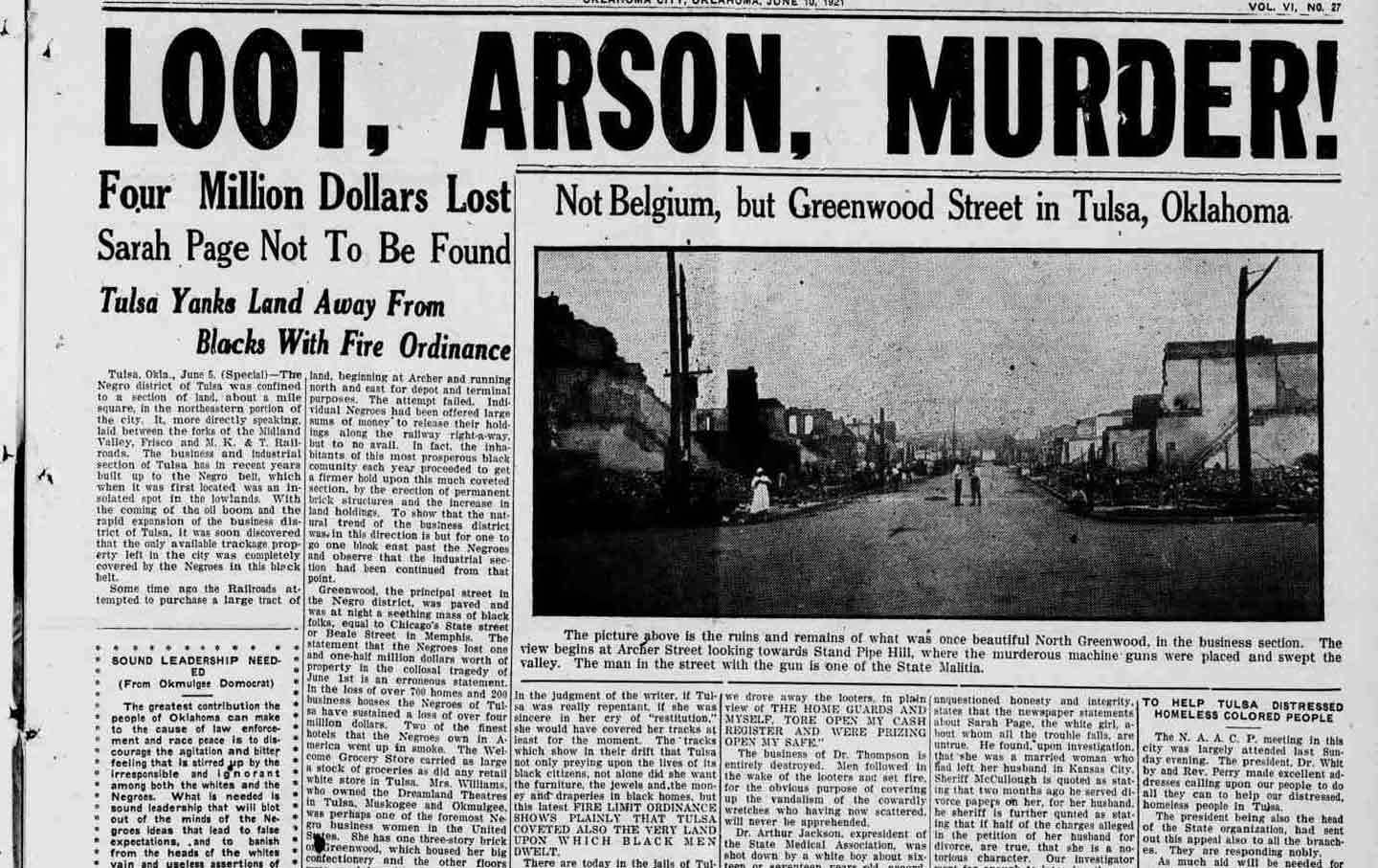Remembering Black Wall Street, A New Pipeline, and Strikes

Written by:
This week marked the 102nd anniversary of the Tulsa race massacre of May 31, 1921, in which white mobs shot up and burned down buildings in the Greenwood District of Tulsa, the location of the so-called "Black Wall Street."
Greenwood had been home to one of the most prosperous Black communities in the country. Former African slaves of Native Americans, who had integrated into the tribes after slavery was abolished, had acquired land through the Dawes Act, which divided up so-called "Indian Territory" into individual parcels for Native Americans. Oil made that land extremely valuable.
At the time, the U.S. was industrializing and seeing a new wave of immigration. But with these developments came a surge of nativism and racist sentiment. In 1915, D. W. Griffith's The Birth of a Nation premiered, which depicted Black people as lazy and violent and valorized the terrorist organization the Ku Klux Klan. That same year saw the Klan re-form into a fraternal organization. At its height, this second Klan boasted more than 5 million members.
It was against this backdrop that the Tulsa massacre occurred. The spark for the violence was a headline. The events of the day are hazy, but what is generally accepted is that Sarah Page, a 17-year-old white elevator girl accused Dick Rowland, a 19-year-old Black shoe shiner, who had stumbled into her, of assault on May 30, 1921. The next day, Rowland was arrested and The Tulsa Tribune ran the headline "Nab Negro for Attacking Girl in an Elevator" in its afternoon edition.
It wasn't long before a white lynch mob had gathered outside the courthouse where he was being held. Members of the Black community armed themselves and went to meet this white mob and shooting began.
That violence marked the start of the destruction of Greenwood. The armed white mob began shooting residents, arsonists began burning down buildings. There are even reports that airplanes dropped firebombs on the area. Beyond accusations made against Rowland, racist resentment toward the prosperity in Greenwood motivated the mob. In less than 24 hours, 35 city blocks had burned down. More than 1,000 residences had been destroyed. A true death toll remains unknown, but some estimates are in the hundreds.
No white person was ever held accountable for the massacre. The press subsequently described the violence as a failed uprising by Black people. Meanwhile, Page ultimately declined to press charges against Rowland. For many years, this heinous act of domestic terrorism went unrecognized nationally.
This week, we honor the memory of those lost and the resilience of those who survived. The massacre was an eruption of a deep systemic ill that has plagued this nation since its inception.
Today, we are still fighting against efforts by white legislators in states across this country–and even in Congress and the Senate–to prevent schools from teaching this history. Their efforts are best understood as the institution of white supremacy defending itself. Only through recognition of how this grim, violent history echoes today, can we hope for a more equitable future.
For more on the Tulsa massacre, check out this interview of author Victor Luckerson in THE NATION by historian Karlos K. Hill.

Please consider donating $20, $100, $1,000, or whatever you can here!
The Bad Deal
President Biden has officially signed the debt ceiling agreement, which we covered in last week's newsletter.
As we noted, the agreement came under a GOP threat of forcing a default, which would have been catastrophic for the nation's credit and likely sent us into a recession. The deal itself, however, is no prize as it cuts assistance to poor Americans while failing to raise taxes on the wealthy or touch military spending, and includes fast-tracking of fossil fuel projects like a new gas pipeline deal.
As MORE PERFECT UNION revealed this week, the agreement on the pipeline followed donations to key Democrats.

The timing of this fossil fuel expansion could not be worse. A new study recently warned that a climate tipping point could be closer than we think. Plankton, the tiny organisms that live in the ocean are currently carbon absorbers, but rising temperatures could change their eating habits and make them emitters. Such a change could have a devastating impact on the globe. GRIST had the story.

COMMON DREAMS, meanwhile, had a piece this week about how climate change-driven wildfires in the U.S. are reversing years of progress tackling air pollution.

Despite the obvious drawbacks, legacy media touted the agreement as a victory for bipartisanship–incidentally, the same framing the Biden administration has been pushing.

While the agreement ensures that we will not see another debt ceiling negotiation before the election, this is likely not be the last time we see the Republican hostage-taking strategy deployed. For one thing, it worked to deliver substantially on the party's key goals. At a time when millions of Americans are struggling financially, the federal government has once again embraced austerity.
With that, please check out these other important stories from OptOut participating outlets.
Want to keep the OptOut newsletters and app free?
WE ARE A NONPROFIT AND RELY ON YOUR SUPPORT TO CONTINUE OUR WORK!
DONATE HERE!Announcement!
This week, OptOut participating outlet SCALAWAG welcomed a new editor-in-chief in Sherronda J. Brown (they/she), author of Refusing Compulsory Sexuality: A Black Asexual Lens on Our Sex-Obsessed Culture, described as an exploration of "sexual politics and compulsory sexuality under white supremacy, fascism, and capitalism through a black asexual lens." Brown has previously written for PRISM.

Labor in America
The Supreme Court this week handed down a ruling chipping away at workers' rights. But THE REAL NEWS had an important piece about the limitations of the ruling.

Ford auto parts workers were on strike this week over pay and safety concerns. LABOR NOTES had the story.

Wabtec factory workers in Erie, Pennsylvania, who build locomotives and are members of UE Local 506, are fighting a "no strike" clause in their labor agreement, which has led to worse working conditions. IN THESE TIMES reported on the situation.

JACOBIN, meanwhile, offered us insight into the Hollywood writers' strike and its implications.

The OptOut Media Foundation (EIN: 85-2348079) is a nonprofit charity with a mission to educate the public about current events and help sustain a diverse media ecosystem by promoting and assisting independent news outlets and, in doing so, advance democracy and social justice.
Download the app for Apple and Android.
Sign up for OptOut's free newsletters.
Learn more about OptOut.
Merch
Follow us on Twitter, Instagram, TikTok, YouTube, Mastodon, and Facebook.
















